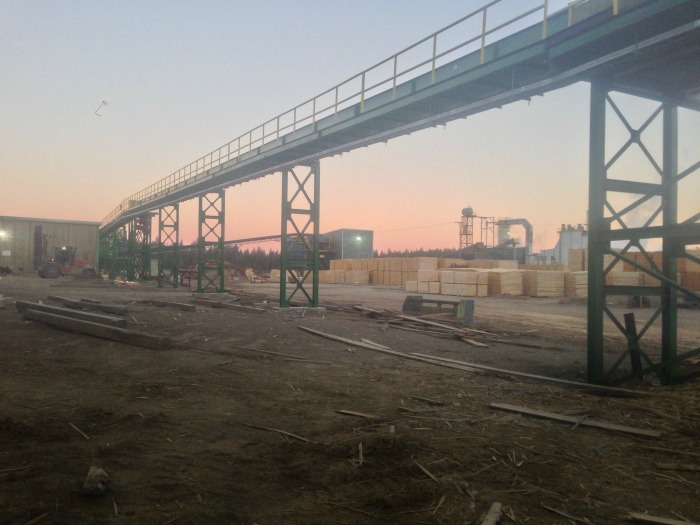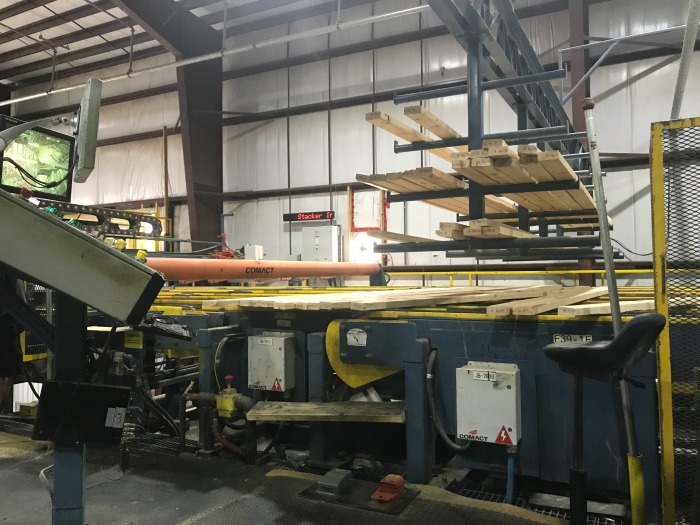
What would it be like to work in a sawmill? What would it be like to work in a sawmill as a 28-year-old woman? Raiah (photo above) shares her story.
Tell us a bit about yourself!
Hi! My name is Raiah. I’m 28 and I live in small town in the mountains in British Columbia. I love travelling, biking, climbing, and being in the mountains. I have a Bachelor of Science in Kinesiology, and I plan to get my Masters in Occupational Therapy.
How did you find yourself working in a sawmill?
A couple years into my Bachelors degree, I took four months off of my job in a Physiotherapy Clinic to do an outdoor leadership program. I did this with the understanding that I’d be able to return to my job in the fall. When I came back I was told that they didn’t need me anymore. I needed a job quick and the mill happened to be hiring. My dad works there, which is how I knew that they were hiring.
What sort of training did you go through to get this job?
I had a full day of dedicated training/orientation followed by on the job training. My orientation day was full of reading and safety presentations. I got a tour of the facility; they issued my locks and taught me lockout policy.
By the time I got on shift I had a fairly good understanding of the company’s safety policies. All of the specific job training happened on shift. Training in a particular job usually takes 1-2 weeks. During that time you’re paired with an experienced worker. Before you can work alone, you have to read and sign the JSA (Job Safety Analysis) and your supervisor must confirm that you are competent.
Can you walk us through an average workday?
It can be drastically different depending on where you are working. The mill is roughly split into 5 areas: (1) logyard, (2) sawmill, (3) kilns, (4) planer, (5) shipping yard. I’ve spent most of my time in the sawmill and the planer. Currently I’m working in the planer but I spent a large portion of the winter in the sawmill on basement cleanup.
The basement cleanup person is responsible for keeping all the basement conveyors going, answering radio calls, doing dust control, and cleaning up certain areas of the basement.
Dust control is a fairly serious business. If dust builds up and the right conditions are met, you can actually get a dust explosion. So the company is pretty serious about combustible dust prevention. You have to make sure you do your dust clean up every two hours.
Each shift also has particular areas of the basement to clean. This is usually stacking boards, sweeping floors, feeding wood into the chipper, shoveling sawdust into conveyors, etc.
You’re also carrying the radio at all times. At any point you might get a call and need to leave what you are doing. Anytime a conveyor goes down, the operators upstairs will call you.
There are probably about fifty conveyors in the basement and they are all identified by numbers (eg. 1085, 2108, etc). The operator will give you the conveyor number and then it is your job to find it and get it running again. Sometimes this means just restarting it, sometimes it means unjamming it and then restarting it, and sometimes it means calling an electrician or a millwright to reset it or fix it.
Your supervisor could also call you at any time and give you something different to do. So while there’s a general structure to the job, there’s also a lot of room for variation depending on the day.

What’s your working environment like?
It is noisy. You’re required to wear hearing protection at all times and there are even a few places where double hearing protection is recommended.
While most of the jobs are indoors, the buildings are not particularly well insulated or heated/cooled. So it gets very cold in the winter and very hot in the summer.
Emotionally/psychologically it is a weird place to work. It is a seniority-based union. Everything is determined by seniority. What job you do, whether or not you get overtime, when you get to take holidays. It feels like the only thing that matters is how long you have been there. The general attitude is that you just need to be good enough to not get fired and then you put in your time until you have the seniority to get to the job you want.
Not everyone is like that, but it is definitely a trend among most workers that you do the bare minimum and you look out for number one. This also seems to fuel a lot of gossip. I have never worked in a place so fueled by gossip and rumours before. Everyone is talking about everyone all the time.
I am right near the bottom of the seniority list, so I am basically at the whim of everyone above me. If they want my job, they can take it. (This is why I spent most of the winter in the freezing cold basement on cleanup)
You’re one of five or six women who work on the floor of the sawmill. What’s that like?
Physically, everything is too big. When I started I was given a men’s XL safety vest and gloves so large my fingers almost didn’t even reach the fingers. They definitely don’t stock anything in women’s sizes and even getting a men’s small is a struggle. Also being small sometimes makes the work harder. Some of the biggest boards we make are so heavy I can’t really move them even using my entire body weight.
Emotionally it is hard sometimes. I get dismissed and talked down to a lot, especially when I was new. Once I’d been around a while and people got to know me it got a bit better, but it still happens. I feel like I constantly have to prove that I know what I’m doing and that I’m capable.
Some men ignore me entirely. Some will sort of talk around me and avoid actually looking at or talking to me directly.
Some men are very nice to me and go out of their way to help me. Some men seem to almost follow me around and sort of butt in and take over whenever anything goes slightly wrong.
I think that having my dad working out there has helped me a bit in that it has likely saved me from some of the creepier stuff. I have had a few uncomfortable encounters (being asked very personal questions, being touched/having my personal space invaded, etc). But, overall, most of the guys treat me well or ignore me entirely.

I think most of us imagine a sawmill would be super dangerous, like we’d cut our thumbs off on Day 2. Have you ever had any close calls?
Once I was working by one of the chippers in the sawmill basement. I don’t know if you’ve ever seen wood go into a chipper before, but when the long boards first catch in the knives, they can kick out to the side pretty violently. I knew that this happened and was being careful to stay out of the way but I guess I got distracted and got a little too close. A board kicked out and smoked me in the side of the head.
It hit me in the hard hat, but it hit me hard enough that it hurt my neck and I had to sit down for a minute. If it had hit me in the face I probably would have gotten a pretty good black eye or a broken nose.
You worked this job during college and now you’re back to save up for grad school. Do your coworkers know this?
Most of them know. Most of them encourage me to go back to school. I almost have to assure some guys that this is a temporary job for me. A lot of guys tell me about how they had other plans for their lives and then ended up getting stuck at the mill. I’ve even had supervisors tell me that if they could do it over they would go to school and get a better job. So yeah, everyone is pretty supportive about me going back to school.
How much does the average millworker make in a year?
Entry level wage is about $29 an hour. The highest paying productions jobs are on mobile equipment (forklifts, loaders, graders) and pay around $32 an hour. Tradesmen are more in the $41-$42 an hour range. So whatever that works out to. And then sometimes there is overtime as well. So some guys can increase their earnings quite a bit if they have the seniority to get the overtime.
What’s the best part of this job? The most challenging?
Honestly, the best part of this job is that it pays well and allows me to save money. This job paid for my six month trip through Australia and New Zealand and it will pay for my Masters Degree. I also have met a few really great people who I probably never would have crossed paths with had I not worked at the mill.
The most challenging part is probably dealing with all the union/seniority stuff. It is hard to not know your schedule more than a week ahead of time and to know that at any time someone with more seniority could bump you off your job and send you back to night shift. Also shift work sucks.
What have you learned from this that ANY of us could apply to our daily lives?
Wear your earplugs ALL THE TIME.
Don’t be afraid to try something new. I spent so long refusing to consider this job because I had already decided what it would be like. Turns out it has been a great way to fund my school and travel.
Thank you so much for sharing your story, Raiah! Do you guys have any questions for her?
P.S. True Story: I’m a lady geologist, living + working on an oil rig












I have to agree that shift work sucks, but I suppose it a part of many other jobs too. My parents are nurses and it makes me so uneasy seeing my Dad work night shift at the hospital regularly even though he’s so old now!
Thank you for sharing about your job at the sawmill. It was really interesting!
Charmaine Ng | Architecture & Lifestyle Blog
http://charmainenyw.com
$29 an hour for starting wage???!!!?! That’s great!!!!!
Where is this mill?
Working in a saw mill can be weird. Especially being a woman in a man’s world. I understand the ones that avoid you, or help you, or at the very least, acknowledge you. It’s a strange place to work.
I’m over in washington and was hired on with two other women. I now know why they did. We banded together and work our butts off, doing terrific work, for laborers. But would not have seen the same support if I had been hired with only men around me. Some are gentlemen, some are ignorant and others are just rude.
Thank you for your insight. It makes me more appreciative of what my company provided me with!
Hoping someone is reading these comments. Can we not put my last name?